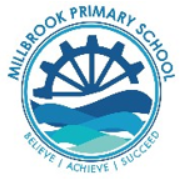Reading
reading at millbrook
“Reading is the rocket that will take you to infinite worlds. Jump aboard!” Maz Evans
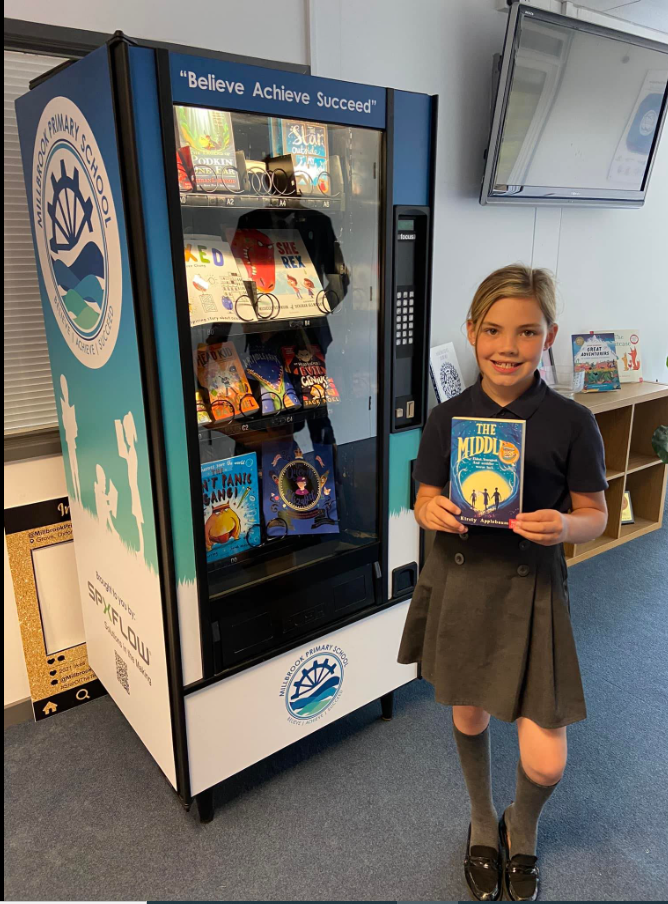
being a reader at millbrook
vision
We believe that reading is the master skill of school, as ‘learning to read’ and then ‘reading to learn’ unlocks the academic curriculum both in school and beyond! We want every child to leave us as a competent reader. Here at Millbrook Primary School, reading is a fundamental part of school life, both inside and outside of the classroom. Reading provides opportunities for children to develop their vocabulary and imaginations; give opinions in class discussions; take ideas to use in their writing; and, ultimately, interpret and become engaged in the world around them.
Intent
Millbrook staff and pupils value reading highly. We recognise that reading for purpose and reading for pleasure is of fundamental importance, impacting every subject in our curriculum and each child’s own wellbeing. Our school culture looks for every opportunity to promote and celebrate reading.
In order to be competent readers, Millbrook pupils must:
- decode accurately and with automaticity
- monitor their own comprehension and self-select from a toolkit of strategies when the meaning is not immediately clear
- use key skills such as retrieval and inference to understand a writer’s message and methods
- read independently and for pleasure
Reading support
It is vital if we are to achieve our ambition of ‘every child leaving school as a competent reader’ that we also provide intervention and targeted support for our children at every step of the way along their reading journey from Foundation Stage to Year 6. Staff quickly identify any children who need extra help or are at risk of falling behind. Teachers and teaching assistants skilfully support pupils, including those with special educational needs and/or disabilities (SEND). This helps all pupils to develop secure knowledge and skills in these subjects, catching up if needed.
From Year 1 to Year 6, every class has a white reading folder that captures all of the targeted support provision for our children, including our lowest 20% readers and focus children. This folder is used by any adult within school (teacher; teaching assistant; volunteer reader; buddy reader) when listening to children read or working 1:1 with a child on a specific reading focus.
Implementation – Whole School Culture
During the school day, children are immersed in a ‘reading-rich’ culture. We believe that reading for purpose and reading for pleasure are both of key importance for children’s wellbeing, development and future. For this reason, our reading-rich curriculum ensures that a variety of fiction and non-fiction texts are used in a range of settings, including: early morning work; English lessons; whole-class reading lessons; Accelerated Reader program; phonics lessons; foundation subject lessons; read and relax sessions; assemblies; school library browsing time; the classroom book corners; intra-school reading buddies; adult reading buddies; reading volunteers; ‘breakfast and books’ club, or through listening to a story as a class.
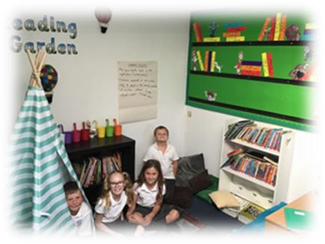
Our rich and varied reading curriculum helps our children develop culturally, emotionally, intellectually, socially and spiritually. At Millbrook, we believe that small, daily acts of reading matter. For this reason, all our children will be read to every day with a text selected from our bespoke school reading spine. Class readers often start as picture books, rhymes and stories in foundation stage during “Sing a song or story” time, through to reading class novels and poetry in KS2.
Promoting a love of reading from the beginning
Promoting a love of literature is the first step in creating lifelong readers. This starts in our Nursery where children experience daily stories and activities that help them develop their language and vocabulary. Cosy, inviting book corners that contain favourite well-loved stories builds reading confidence as it enables children to independently ‘read’ familiar texts. Alongside this, children begin their journey of identifying words and sounds in their environment through songs, games and music. Children are also introduced to a range of non-fiction books from Nursery, and from Reception, children have a term topic focus on non-fiction.

In Reception, our children are exposed to a wealth of carefully chosen literature which enables them to explore their feelings, the world around them, and helps them to develop their understanding of new vocabulary. They are also provided with lots of musical experience that supports them with linking sounds to symbols, and understanding rhythm and rhyme.
Their personal reading journey starts through the Read Write Inc phonics scheme which rapidly teaches our children the sounds and skills they need to blend words and read simple sentences. The carefully linked reading books allow them to use and apply their skills whilst maintaining an understanding of how a good reader should sound. Each week, children have the opportunity to take home their phonetically-matched reading book, as well as a book of their choice from the library to share with grownups at home.
Phonics
At Millbrook we use the Read Write Inc (RWI), synthetic phonics programme primarily in our EYFS classes and KS1. Using RWI, the children learn to read effortlessly so they can put all their energy into comprehending what they read. It also allows them to spell easily so they can focus on the composition of writing.
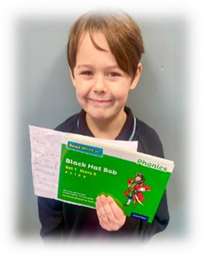
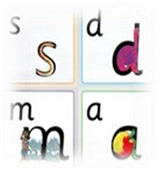

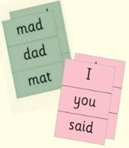
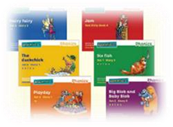
When using RWI the children will:
- Learn 44 sounds and the corresponding letter/letter groups using simple picture prompts.
- Learn to read words using Fred Talk. Decodable words (green) are words that can be sounded out. Non-decodable words (red) contain a tricky part.
- Read Storybooks that are decodable, and feature words that they have learnt to sound out.
- Take home ‘Book Bag Books’, linked to the core Storybooks read in class. These are sent home weekly
- Show that they can comprehend the stories by answering questions.
- Learn to write the letter/letter groups which represent the 44 sounds.
Frequent assessments mean that groupings are fluid as the programme works on the stage, and not the age of the child.
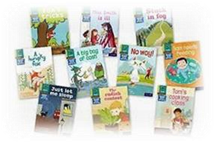
Implementation – Whole Class Teaching
At Millbrook, our teaching of reading is driven through the use of the VAT Reading Framework. The ‘key principles for reading’ provide the foundation of our reading curriculum and are the driving force behind our approach. As well as teaching reading skills (vocabulary, retrieval, summary, inference, prediction, analysis), we also incorporate reading basics and strategies (word reading, fluency, monitoring understanding and comprehension monitoring) and reading competencies (background knowledge, comparison, connection and empathy) into our reading teaching.
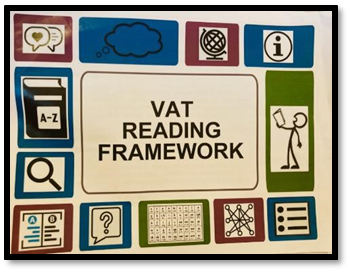
Reading lessons cumulatively build upon these three key areas, and include a clear sequence of modelled instruction, shared instruction and opportunities for guided and independent practice. These skills are applied by the children with increased independence when interacting with texts across all curriculum areas.
At Millbrook, our children regularly have opportunities to read aloud to their peers, adults and whole class. This helps improve their reading confidence, fluency and prepares them for their future. In addition, we value time for children to read a book of their choice for pleasure in what we refer to as our ‘read and relax’ sessions.

our Reading Spine
Our reading spine has been carefully curated to include a range of ages of text, genres, text structures and diversity of characters and authors. Fiction texts are selected to be m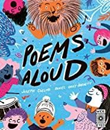 ore challenging than the majority of pupils could access independently. The writing must be of high quality, supported, where relevant, by similarly high-quality illustrations, and with opportunities for inference. They are also texts that our staff enjoy, as we know that our enthusiasm rubs off on the children! Non-fiction texts are included for every year group to teach the skills of reading for information. Both fiction and non-fiction texts are used to make the process of reading explicit through modelling.
ore challenging than the majority of pupils could access independently. The writing must be of high quality, supported, where relevant, by similarly high-quality illustrations, and with opportunities for inference. They are also texts that our staff enjoy, as we know that our enthusiasm rubs off on the children! Non-fiction texts are included for every year group to teach the skills of reading for information. Both fiction and non-fiction texts are used to make the process of reading explicit through modelling.
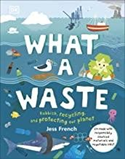

Where appropriate, they link to other areas of the curriculum; we recognise the opportunities that this gives our children to reinforce and extend their schema.
Implementation – Reading in KS2
At Millbrook we are using the Read Write Inc phonics programme, and at present, to support catch up, we are using it into Year 3 and 4. We believe this provides an opportunity to ensure targeted support can be directed where needed and helps us to close any reading gaps.
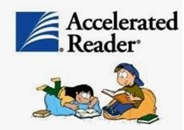
From Year 3 onwards, children migrate onto the Accelerated Reader program. Accelerated Reader is a computer program that supports teachers in managing and monitoring children’s independent reading practice.
Children choose books to read based on their personalised ‘ZPD’ (Zone of Proximal Development) which is generated after completing a short, computerised reading assessment, known as a ‘Star Test’ that uses computer-adaptive technology. Children complete Star tests once every short term so that their ZPD numbers are a true reflection of their current reading ability using real-time data at different points in the school year. This means that pupils can select books from the class or school library that fall within the book range which they have been allocated. The book range will allow pupils to select books that will challenge them without causing frustration or loss of motivation. It is important for children to read with a high degree of comprehension, and reading within the book range will provide the opportunity for this.
When children have finished reading a book from within their book range, they take a short quiz on the computer (passing the quiz is an indication that the pupil has understood what was read). AR gives both pupils and teachers’ feedback based on the quiz results, which the teacher then uses to help set targets and direct ongoing reading practice.
Every book that has an AR Reading Practice Quiz is given a point value. AR points are computed based on the difficulty of the book and the length of the book. Pupils earn points, or a portion of a book’s points, depending on how well they do on the Reading Practice Quiz. In addition, the program provides further opportunities to celebrate children’s success as it cumulatively calculates the number of words children have read after successful quizzing: children can then work towards the prestigious accolade of becoming a Millbrook ‘Word Millionaire’.
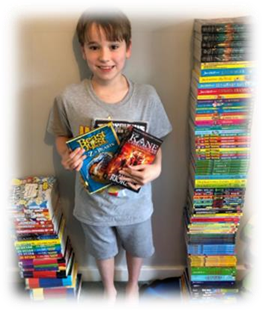
Implementation – Reading Enrichment
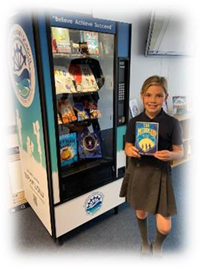
We are very proud of our ‘Mill-book’ vending machine! Every term, each class’s ‘Star of the Term’ receives a golden ticket which they bring to Mrs Charlton in exchange for a special token which they can use in the machine and pick their very own book to keep forever! This helps promote our reading for pleasure offer at Millbrook. The vending machine is well-stocked with a range of books from our bespoke reading spine.
Our pupils all have access to well-stocked book areas in each classroom, as well as from our school library, where they can borrow books to enjoy at home. In classrooms, you will find ‘Book Recommendation’ displays. These help our children to discover new authors and books, as well as helping them to develop and grow their reading preferences.

We also provide a wealth of enrichment opportunities, such as author visits and workshops; whole school reading events such as the Winter Bedtime Stories evening for parents and children, and librarian sessions at our local library. This ensures that children benefit from access to positive role models from the local and wider community.

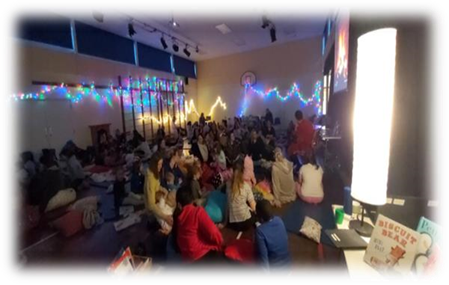
Our aim is to promote a love of reading amongst our children, and our regular whole school events, such as World Book Day celebrations, book fairs, and ‘MillBook recommends…’ display in our entrance hall, also serve to support this goal.
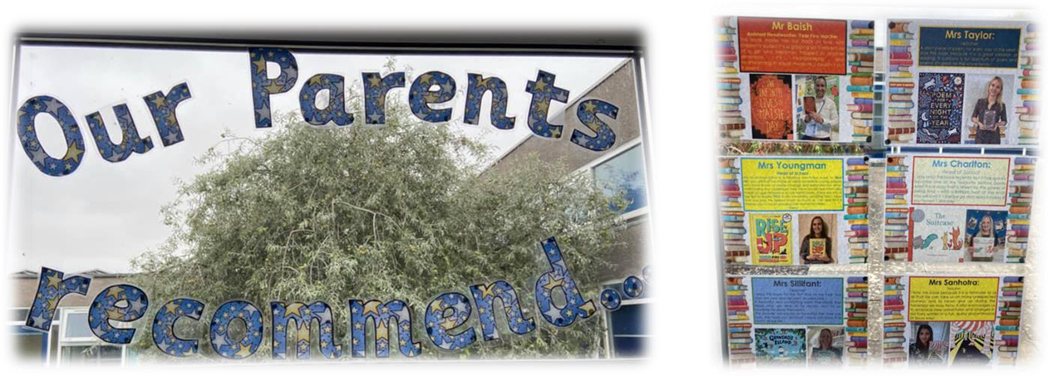
Our School Library
Our school library is open every day to all children. Children are allowed to borrow any book within the library, giving them access to a greater range of genres than those found in their class book corners. As well as fiction, we have weekly newspapers, graphic novels and an extensive non-fiction section. The library hosts a ‘Book Club’ on a Wednesday lunchtime for children from Y2-6 to come and read or partake in reading inspired activities. The library is staffed by our librarian Mrs Hinder and our team of 'Junior Librarians'.

Their responsibilities include: restocking books when returned; helping issue books during lunchtimes when the library is open; helping children choose new reading books when they are stuck; sorting new books into their correct placements, and also tidying the library, ensuring it looks as neat and as inviting as possible. We also have close links with our local Grove library and our children attend sessions and visits, where again, they can partake in library skill sessions, as well as lessons and book browsing time.
Impact
We believe that reading is the master skill of school, as ‘learning to read’ and then ‘reading to learn’ unlocks the academic curriculum both in school and beyond! We want every child to leave us as a competent reader.
Phonics Assessment
Those delivering the daily phonics sessions use formative assessment to monitor which children have grasped the sounds and which need ‘keep-up’ support. In particular, the weekly review lesson is used to assess gaps in GPCs, word reading and fluency. Summative assessment is used every six weeks to gauge progress; the results are added to the Read Write Inc tracker. All of this assessment is used to inform planning for teaching and ‘pinny time’ interventions.
KS1 Statutory Assessment
Children in Year 1 sit the Phonics Screening Check. Any child who does not pass the check re-sits it in Year 2.
KS2 Reading Assessment
We understand that the assessment of reading is a “gathering of multiple…glances” (Prof. Coe) involving a range of formative and summative methods, including hearing pupils read, group/class discussion and written evidence. As a consequence, we employ a range of different techniques to gain the widest possible understanding of each child’s reading ability: Star Tests, reading aloud 1:1, verbal/written responses in whole class reading lessons and a written paper on unseen extracts in Term 4. Each pupil has an individual tracker card in the class reading folder where their strengths and areas for development are noted by the class teacher. This holistic approach to assessing reading gives a much fuller picture of a child’s achievement levels in reading than a single summative score and equips staff to know how best to support their progress.
KS2 Statutory Assessment
Year 6 pupils sit the KS2 statutory reading paper in May. Prior to this, mock papers are completed in October and January/February. These enable the children to become familiar with the demands of the test, as well as any access arrangements to which they are entitled. In addition, feedback is planned by the Year 6 staff – whether 1:1, group or whole class – to address areas of development from the mocks, enhancing their usefulness as an exercise which informs teaching, not just producing numerical data.
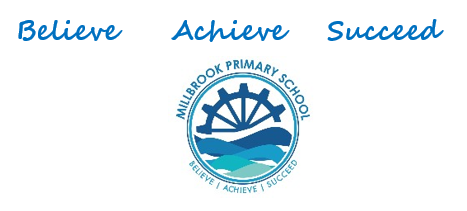
LAYER 1 - Whole school long term plan
Layer 2 - Reading knowledge and Skills Progression Map
Layer 3 - sample plans
Reading Matrix
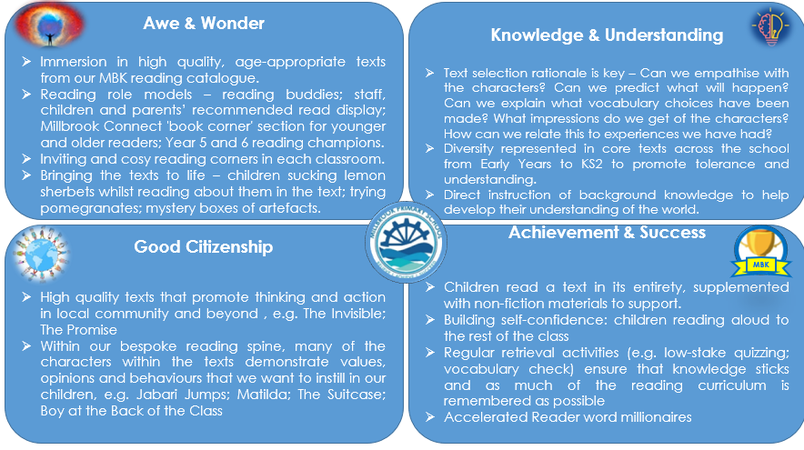
Reading Leadership Team
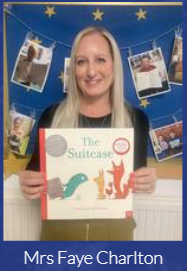
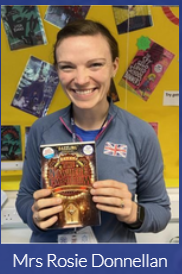
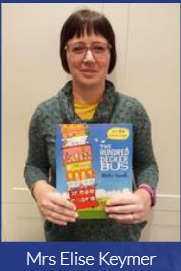
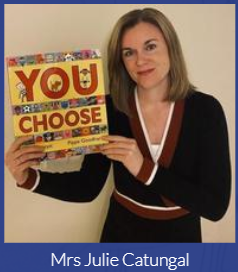
our Book Vending Machine!
We are very proud of our book vending machine! Every term, each class’ Star of the Term receives a special token which they can use in the machine and pick their very own book to keep forever! This helps promote our reading for pleasure offer at Millbrook.
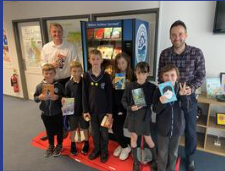
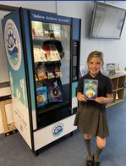
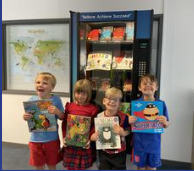

Click here to Watch our vending machine being 'officially opened'!

